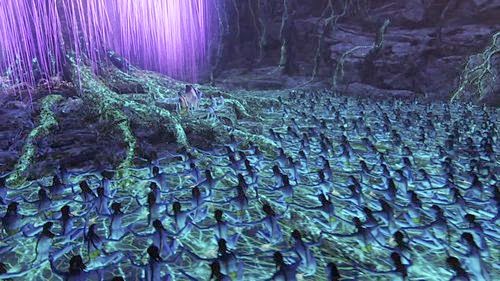"Eywa does not choose sides. She only protects the balance of life" (Neytiri, Avatar).
This quote is taken from Neytiri from the movie Avatar. She overhears Jake praying to Eywa at the Tree of Souls. He asks for her help in defeating the "sky people," or humans. Neytiri hears this, and tells him that Eywa does not pick sides when it comes to nature; she only protects a balance.
In nature, there is always an optimal balance of each piece of the system. If one piece becomes too strong or too weak, the balance is thrown off, and as a result, the ecosystem suffers. This is what happened on Earth in the movie. The balance was thrown off by humans and their greed. No one on Earth listened to "their mother," or Mother Nature. Eywa, much more revered in Na'vi culture than Mother Nature has been in human society, is protecting all parts of the ecosystem on Pandora through the networks inside of the ecosystem.
 Dr. Grace Augustine is studying the plants on Pandora. Throughout various parts of the movie, she talks about a network, similar to the human brain, within the ecosystem of Pandora. Pandora's network however, has seemingly infinite more connections. "It has more [connections] than the human brain" (Grace, Avatar). The trees on Pandora are a part of that network, as well as the animals on the planet, and the Na'vi people can tap into that network through the bond inside of their braid. This bond is how they connect to the animals and plants on their planet. It is part of how they understand how to protect their natural world and the reasoning behind it. Eywa seems to be the controller of this network. She, their goddess, has a way to be tangibly measured through science.
Dr. Grace Augustine is studying the plants on Pandora. Throughout various parts of the movie, she talks about a network, similar to the human brain, within the ecosystem of Pandora. Pandora's network however, has seemingly infinite more connections. "It has more [connections] than the human brain" (Grace, Avatar). The trees on Pandora are a part of that network, as well as the animals on the planet, and the Na'vi people can tap into that network through the bond inside of their braid. This bond is how they connect to the animals and plants on their planet. It is part of how they understand how to protect their natural world and the reasoning behind it. Eywa seems to be the controller of this network. She, their goddess, has a way to be tangibly measured through science. An incredible power that Eywa has, that the Na'vi people utilize, is the power to transfer the soul of a human being into the body of their avatar permanently.
An incredible power that Eywa has, that the Na'vi people utilize, is the power to transfer the soul of a human being into the body of their avatar permanently.During one of the tense fight scenes, Dr. Grace Augustine is injured. She is shot in the stomach, and knows that she will not survive much longer. In the hopes that the Omaticaya people can do something for her, Jake, in his Na'vi form, brings Grace's human body and avatar body to the Tree of Souls. There, the Sahik, the woman Shaman of the Omaticaya clan, performs the necessary ritual to present this deal to Eywa. She iterates that Eywa, the goddess herself, must choose if Grace's soul should be transferred to her avatar body. Eywa instead, chooses to keep Grace within herself. She absorbs Grace's soul into the network of Pandora, something that Grace would have probably wanted anyway.
I revel in the thought of a woman goddess at the top of the hierarchy of mythology for the Na'vi people. Although I am sure she was meant to represent the "Mother Nature" of the plant Pandora, it is still inspiring that she would be the governing body over all life. Generally, in mythology, men are consistently at the top of the chain. In the Christian religion, there is the Holy Trinity, God the father, God the son, and God the holy spirit. In the Muslim religion there is Allah, who is also a man. In Buddhism, there is Buddha, another male. Even a majority of the Roman Gods were male. Of course there were some women, but Zeus was always at the top of the hierarchy for many of the stories. Maybe the use of a female was to perpetuate the idea that women are similar to nature. Maybe it was to pay respect to women for being reverent of nature and the Earth. Either way, a woman was still above all living things.



